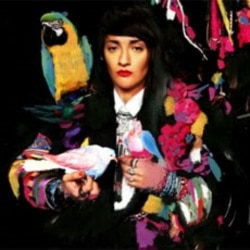Or download MP3 (Right-click or option-click and save link)
STEVE EMBER: I’m Steve Ember.
SHIRLEY GRIFFITH: And I’m Shirley Griffith with EXPLORATIONS in VOA Special English. Today we travel around the world listening to the music from six creative and exciting albums. Some artists are well known, while others are at the start of their musical careers. The music we will listen to comes from a wide range of influences and traditions. We begin with music from South Africa that is sure to make listeners want to dance.
(MUSIC: “Vana Vasesi”)
STEVE EMBER: That was the song “Vana Vasesi” from the album “Shangaan Electro: New Wave Dance Music from South Africa.” It features twelve songs by different artists. The Shangaan are an ethnic group living in southern Mozambique and parts of South Africa. In the township of Soweto, music producer Richard Hlungwani redefined traditional Shangaan music by making the beat much faster. New York-based radio producer Wills Glasspiegel discovered this energetic music and helped bring Richard Hlungwani’s work to a larger audience outside South Africa.
Dancing is a huge part of this music. Shangaan street dancers move their feet as fast as lightning and shake their bodies to the music’s beat.
(MUSIC- “Problema de 2”)
SHIRLEY GRIFFITH: Ana Tijoux was born in France to a French mother and Chilean father, who lived in exile during the rule of Augusto Pinochet. When she was in school, she loved to study poetry, which has influenced her song-writing.
In Chile, Ana Tijoux became interested in the hip-hop music she was hearing in Santiago. She was a member of a successful hip-hop group called Makiza.
She has also made two albums performing on her own. Her latest album “1977” is named after the year she was born. Here is the title song from that album.
(MUSIC: “1977”)
STEVE EMBER: Rachid Taha was born in Algeria but grew up in France. His songs are influenced by North African music as well as rock and techno. He sings in both Arabic and French.
(MUSIC: “Ha Baby”)
Taha is known for being both a rebel and a poet. His songs often discuss the reality of living in exile and missing one’s homeland. His music has earned him many fans, especially among Arab-speaking immigrants living in France.
(MUSIC: “Bonjour”)
Rachid Taha’s latest album “Bonjour” is influenced by American rock and country music. It is the first album he recorded in the United States. He has said that he has another musical goal related to American music: to one day sing a song with country music star Dolly Parton.
(MUSIC: “Basement Bhangra Anthem”)
SHIRLEY GRIFFITH: DJ Rekha is the professional name of Rekha Malhotra. She was born in London to Pakistani parents but grew up in New York City where she still lives. DJ Rekha has helped introduce bhangra music to New Yorkers with her monthly music parties. Bhangra music is an ancient form of folk music from the Punjab area of India and Pakistan. This music was performed during seasonal dance celebrations. Modern bhangra music is a huge part of pop culture in South Asia.
(MUSIC: “Snake Charmer”)
DJ Rekha combines bhangra with electronic music, hip-hop and many other sounds and influences. She is helping to break barriers in a dance club industry where many DJ’s are men.
(MUSIC: “Hold You”)
STEVE EMBER: The Jamaican singer Windel Beneto Edwards, known as Gyptian, sings reggae and dancehall music. He grew up singing at his mother’s church. He was also influenced by the music his Rastafarian father listened to.
He first gained wide attention in two thousand four when he won a talent competition on Jamaican television. Gyptian most often sings love songs. He has a gentle and expressive voice that has earned him the name of the “Sexy Rasta”. One of his early hits in Jamaica, “Serious Times”, had a political message. His recent release “Hold You” is bringing Gyptian a whole new level of attention and praise.
(MUSIC: “Oursoul”)
SHIRLEY GRIFFITH: Hindi Zahra writes songs that combine jazz and blues music with the drumbeats of Morocco. Critics have compared her sensual voice to the American blues singer Billie Holiday. Hindi Zahra grew up in a Berber family in Morocco. Her mother sang in their village, and her uncles were musicians. The many traditions of North African music she listened to as a child had a big influence on her.
Zahra later moved to Paris, France. She found work singing on other artists’ hip-hop recordings. She also spent years writing her own music. Her album “Handmade” shows some of the results of these song-writing efforts. She sings mostly in English, with one song in her native Berber language. We leave you with Hindi Zahra’s song “Stand Up.”
(MUSIC: “Stand Up”)
STEVE EMBER: This program was written and produced by Dana Demange. I’m Steve Ember.
SHIRLEY GRIFFITH: And I’m Shirley Griffith. You can read and download programs on our Web site, voaspecialenglish.com. You can also find us on Facebook, Twitter, and YouTube at VOA Learning English. Join us again next week for EXPLORATIONS in VOA Special English.





